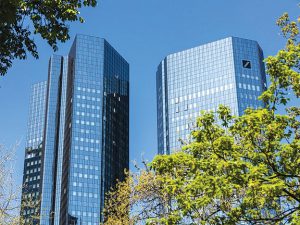Bloomberg
Deutsche Bank AG reversed course and is now joining Wall Street banks Goldman Sachs Group Inc. and JPMorgan Chase & Co. in pulling back from business in Russia following the country’s invasion of Ukraine.
“Like some international peers and in line with our legal and regulatory obligations, we are in the process of winding down our remaining business in Russia while we help our non-Russian multinational clients in reducing their operations,†the Frankfurt-based bank said in a statement, adding that it has already “substantially reduced†its exposure to the country since 2014. “There won’t be any new business in Russia.â€
The statement from Deutsche Bank marks a swift change for Chief Executive Officer Christian Sewing, who said a day ago that the German lender wouldn’t pull out of Russia.
“We are often asked why we are not withdrawing completely from Russia,†Sewing said in a memo to staff. “The answer is that this would go against our values. We have clients who cannot exit Russia overnight. And, as far as we can, we will continue to also support them, too, at this difficult time.â€
Deutsche Bank’s withdrawal won’t include its information-technology hub in Russia. But the front-office pullback follows moves by JPMorgan, the biggest US bank, which said it is currently engaging in limited activities in the country, and Goldman Sachs, which said it plans to close its operations there.
The finance-industry titans are joining those in other sectors, including McDonald’s Corp. and Coca-Cola Co., that have already said they’ll halt business operations in the nation as the death toll rises in Ukraine and millions of refugees flee.
A Deutsche Bank spokesman said that the bank plans to keep an IT hub in Russia, which employs about 1,600 out of the lender’s total 1,700 staff in the country. That center, across two offices in St. Petersburg and Moscow, provides software development for the firm’s trading unit and other businesses, according to the bank’s website.
The lender has previously flagged that the tech center is at risk of being shut down while saying that the scenario doesn’t pose a business-continuity issue since it’s one of several such facilities Deutsche Bank has around the world.
Deutsche Bank flags
$8.8 billion payouts
Deutsche Bank AG’s Christian Sewing vowed to raise profitability and flagged $8.8 billion in potential capital distributions, in an effort to narrow the gap with peers after turning around Germany’s largest lender.
The chief executive officer is targeting a return on equity of more than 10% by 2025, up from 8% this year, along with annual revenue growth of around 4%. The new targets also include a commitment to pay out half of the bank’s net income to investors in four years’ time.
Sewing’s strategy update comes three years after he embarked on an extensive restructuring to end a crisis of confidence in bank’s business model. He cut thousands of jobs and quit equities trading, while a market rally fuelled a rebound in revenue. But Russia’s invasion of Ukraine has abruptly stopped nascent recovery for Europe’s banks, by saddling them with souring loans and delaying a much-anticipated increase in interest rates.
“Our strategy is now about shifting to sustainable growth and increased distributions to shareholders,†Sewing said in a statement.
Deutsche Bank hasn’t managed a double-digit return in a decade, according to data compiled by Bloomberg. If it gets there, it would mark the first time in years that it’s earning its cost of capital, Sewing said, underscoring how far the lender still has to go to close the gap with peers.
The shareholder payouts, similarly, are over a five-year time frame and fall short of pledges by rivals such as UniCredit SpA, which is returning at least 16 billion euros by 2024. Deutsche Bank shelved its dividend when it announced its restructuring in 2019, pledging to return about 5 billion euros to shareholders once it was completed.
 The Gulf Time Newspaper One of the finest business newspapers in the UAE brought to you by our professional writers and editors.
The Gulf Time Newspaper One of the finest business newspapers in the UAE brought to you by our professional writers and editors.
